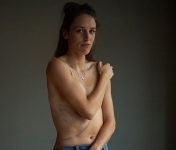Athlete gets cancer. Athlete fights cancer. Repeat, again and again…

“I wouldn’t wish this on anyone, but I have learned that the human mind and body are truly resilient. I rule nothing out.”
By Tim Layden, Sports Illustrated
It was on the morning of Good Friday in 2009 when the runner first met her cancer. She was a fifth-year senior at Minnesota, sitting in the lobby of a hotel in Tempe, Ariz., one day before a college track meet. The runner was born Gabriel Anderson, because her mom liked Biblical names and thought Gabriel evoked both strength and beauty. Plus, it would work fine for a boy or a girl, though the kids in elementary school ruthlessly truncated it to Gabe, which has stuck. One day she would marry a Gophers distance runner named Justin Grunewald and legally add an “e” to her first name, thus transforming into Gabriele Grunewald — but still Gabe to most outside her family. On this morning in Tempe, however, she was just an anxious 22-year-old waiting for a doctor’s phone call that would alter the course of her life.
Several days earlier she’d noticed a tiny bump below her left ear, and a doctor had performed a fine-needle aspiration to remove fluid. Grunewald remembers that procedure to this day because even with everything she has endured since, nothing has been more painful. The fluid was sent out for a biopsy, and Gabe kept training with her teammates, eventually flying off to Arizona. She was in good shape, ready at 22 to start a crowning college season in which she would finally win a Big Ten title, finally earn All-America, finally put up the numbers to launch a professional running career. Plus, it couldn’t be cancer. Just a few weeks earlier her mother, Laura, endured exploratory surgery for what doctors believed was advanced uterine cancer…only to learn post-surgery that she didn’t have cancer after all. The family had escaped. “I went from thinking my wife was going to die to everything is fine and dandy, all right there in a hospital waiting room,” says Gabe’s father, Kim. Life couldn’t be so cruel as to test them again—not this soon.
It was cancer. Gabe’s doctors told her she had adenoid cystic carcinoma (ACC), a rare form found primarily in the salivary glands that occurs in 3.5 out of every million cancer patients. (While there will be an estimated 255,180 new cases of breast cancer in 2017, only 1,200 to 1,300 people will be diagnosed with ACC.) “It’s a cancer most oncologists will never see,” says Naomi Fujioka, now Gabe’s primary oncologist at University of Minnesota Health.
She would need surgery to remove the tumor. In tears, Gabe told her coach, Gary Wilson, that she would seek another year of eligibility to achieve her goals, bureaucratic wrangling be damned. She then gathered her teammates by the hotel pool and shared the news. Ladia Albertson-Junkans, who 16 months earlier had lost her 49-year-old stepfather to Hodgkin’s lymphoma, was so shaken that she ran from the hotel in tears, a reaction she regrets to this day. Most of the others experienced it as a sudden first brush with mortality. “For those women,” says Wilson, “it was like hearing that one of [their] sisters had cancer.”
Continue reading at: si.com
